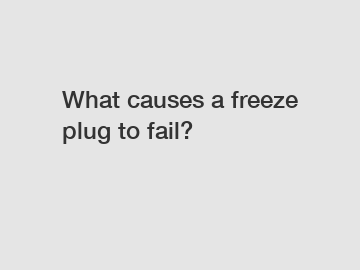Mar. 11, 2024
Mechanical Parts
We rely on our vehicles to get us where we need to go, so it can be incredibly frustrating when something goes wrong with our car. One common issue that can arise is a failed freeze plug. These small but critical components play a crucial role in keeping our engines running smoothly, so it's important to understand what causes them to fail.
A freeze plug, also known as an expansion plug or core plug, is a small metal plug that is installed in the engine block and cylinder head of a vehicle. Its primary function is to prevent the engine from cracking if the coolant inside freezes and expands. When this happens, the freeze plug is designed to pop out to release the pressure, preventing costly damage to the engine.
There are several factors that can cause a freeze plug to fail, leading to leaks and potential engine damage. One common reason for freeze plug failure is corrosion. Over time, exposure to coolant, salt, and other contaminants can cause the metal of the freeze plug to corrode and weaken. This corrosion can eventually cause the freeze plug to spring a leak or pop out completely.

Another common cause of freeze plug failure is improper installation. If a freeze plug is not installed correctly, it may not be able to withstand the pressure of freezing coolant, leading to a failure. It's crucial to make sure that freeze plugs are installed by a qualified professional who understands the proper procedures for installation.
In some cases, freeze plugs can also fail due to age and wear. As vehicles age, the metal of the freeze plugs can become brittle and weak, making them more prone to failure. If you notice signs of a failing freeze plug, such as coolant leaks or engine overheating, it's essential to address the issue promptly to prevent further damage to your vehicle.
Additionally, freeze plugs can fail due to overheating. If your engine overheats, the metal of the freeze plugs can become warped and distorted, leading to leaks and failure. It's crucial to keep an eye on your vehicle's temperature gauge and address any overheating issues promptly to prevent damage to your freeze plugs and engine.
In some cases, freeze plugs can also fail due to impact damage. If a vehicle is involved in a collision or hits a large object while driving, the force of the impact can cause the freeze plugs to become dislodged or damaged. It's essential to inspect your freeze plugs regularly for signs of damage and address any issues promptly to prevent leaks and engine damage.
To prevent freeze plug failure, it's crucial to perform regular maintenance on your vehicle and address any issues promptly. This includes keeping an eye on your vehicle's coolant levels, monitoring the temperature gauge, and inspecting your freeze plugs for signs of corrosion or damage. By taking proactive measures, you can help prevent freeze plug failure and keep your engine running smoothly.
In conclusion, freeze plug failure can be caused by a variety of factors, including corrosion, improper installation, age and wear, overheating, and impact damage. By understanding what causes freeze plugs to fail and taking proactive steps to prevent issues, you can help ensure that your vehicle stays running smoothly and avoid costly repairs. If you suspect that your freeze plugs are failing, it's crucial to address the issue promptly to prevent further damage to your engine. Remember, regular maintenance is key to keeping your vehicle in top condition and preventing unexpected breakdowns.
If you want to learn more, please visit our website hydraulic dowty seals, china rubber ring supplier, china oil seal custom manufacturer.
If you are interested in sending in a Guest Blogger Submission,welcome to write for us!
All Comments ( 0 )